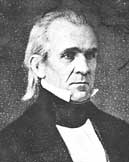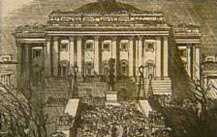James K. Polk
James K. Polk (1845-1849)
By Robert W. Johanssen
University of Illinois at Urbana-Champaign
 James K. Polk
James K. Polk James Knox Polk (1795-1849), 11th president of the United States, was elected in November, 1844, and held office for one term, from March 2, 1845 to March 3, 1849, at age 49 the youngest president until the 20th century. He declined to be considered for reelection. Although he was not widely know at the time of his election, he had served 14 years in the House of Representatives (four of them as speaker) and one term as governor of his home state of Tennessee. As a protégé of Andrew Jackson (he was often called "Young Hickory"), Polk had represented the interests of the Jackson Administration in the lower house of Congress and was recognized as the floor leader in securing Jacksonian legislation. His presidency was the strongest and most vigorous of those between Jackson and Abraham Lincoln. Besides being a loyal Jacksonian Democrat in matter of domestic policy, Polk shared the expansionist fervor of his generation and as president presided over the nation's most dramatic period of territorial expansion. In the brief space of three years, Texas was annexed, the Oregon country was acquired and a half-million square miles of Mexican territory was ceded to the United States as a result of the Mexican War. As America's first wartime president since James Madison, Polk did much to define the role of the president as commander-in-chief. The Mexican War dominated his administration and has influenced his reputation ever since. In spite of the controversy that has often been aroused over Polk's involvement in the war, he fared well in presidential evaluations, as historians consistently place him among the top 10 or 12 presidents of the United States.
James K. Polk was born on November 2, 1795, in Mecklenburg County, North Carolina. [He] was the eldest of the ten children of Samuel and Jane Knox Polk. His father was a well-to-do farmer, and like the rest of the family, strongly Jeffersonian in politics. His mother, said to be descended from the Scottish religious leader John Knox, was a tenacious Presbyterian whose life revolved around the Bible and the teachings of the church. Nurtured on tales of America's War of Independence, Polk derived from his parents a strong patriotism, a keen interest in politics and deep religious convictions.
In 1819, Polk assumed his first political post, that of clerk of the state senate, and four years later he was elected to the lower house of the Tennessee legislature. His academic background, readiness in debate, and persistent application quickly marked him as a promising young leader in Tennessee politics.
In 1823, Polk married Sarah Childress, a well-educated, refined and cultured woman who would be an important asset to his career. She would become one of the most respected first ladies to occupy the White House.
Polk prized individual freedom, the rights of the states against the centralizing tendencies of the national government, and a strict interpretation of the Constitution. The sovereignty of the people, he believed, was unquestioned and absolute.
 Polk's election as speaker of the House of Representatives during his last two terms in Congress, from 1835 to 1839, was a tribute to his leadership, his party loyalty and his administrative ability. When he left the speakership, he boasted, without exaggeration, that he had decided more difficult and complex questions of parliamentary law and order than had been decided by all of his predecessors.
Polk's election as speaker of the House of Representatives during his last two terms in Congress, from 1835 to 1839, was a tribute to his leadership, his party loyalty and his administrative ability. When he left the speakership, he boasted, without exaggeration, that he had decided more difficult and complex questions of parliamentary law and order than had been decided by all of his predecessors.
Polk preferred to remain in the House of Representatives and could easily have been reelected in 1839. Instead, he was persuaded to run for governor of Tennessee. [He] was elected, but his term of office (two years) was anticlimactic and uneventful. It was not a good time for Democrats, as much of the public's attention was focused on the effects of the panic of 1837. Polk was defeated for reelection in 1841, and two years later, he was defeated again. After almost 20 years of public activity and service to his state and nation, his political career appeared to be over.
Nine months after his second defeat for the governorship of Tennessee, in an incredible turnaround of his political fortunes, Polk was nominated for the President of the United States by the Democratic Party. Martin Van Buren was the leading contender for the party nomination in 1844 before the convention met. The presidential race, as everyone seemed to expect, would be run between Van Buren and Henry Clay.
Then on April 27, a bombshell was tossed into the campaign. Washington newspapers carried letters from both Henry Clay and Van Buren announcing their opposition to the immediate annexation of Texas to the United States, on the ground that such a move would constitute aggression against Mexico.
A few days before Van Buren's letter was published, Polk made his views known in response to an inquiry from a committee of Ohio Democrats. Like Jackson, he strongly favored the immediate annexation of Texas, arguing that Texas had been a part of the United States before John Quincy Adams had given it up to Spain in the Adams-Onís Treaty of 1819. He feared, as did many Western Democrats, the rise of British influence in Texas and placed his argument in the broader context of hemispheric security. Unlike Jackson, Polk linked his demand for Texas with the demand that the authority and laws of the United States be also extended to the Oregon country.
Polk won the presidency with 170 electoral votes to Clay's 105. [His] nomination and election, following so quickly after his failures to win the governorship of Tennessee, has been judged well-nigh miraculous.
Polk's inaugural address was in sharp contrast to the gloomy, rainy weather in Washington on March 4, 1845. It was a message of hope and confidence for a youthful nation from a president who was younger than any of his predecessors. More than a third of his address was devoted to the new spirit of continental expansion. He rejected the pessimistic view of some Americans that the nation's system of government could not be successfully applied to a large extent of territory. Missing from Polk's list of intended achievements was the annexation of Texas, for by the time he was inaugurated, that annexation had already been set in motion. It remained only for Polk to complete the process following his inauguration.
Page 1 | 2






